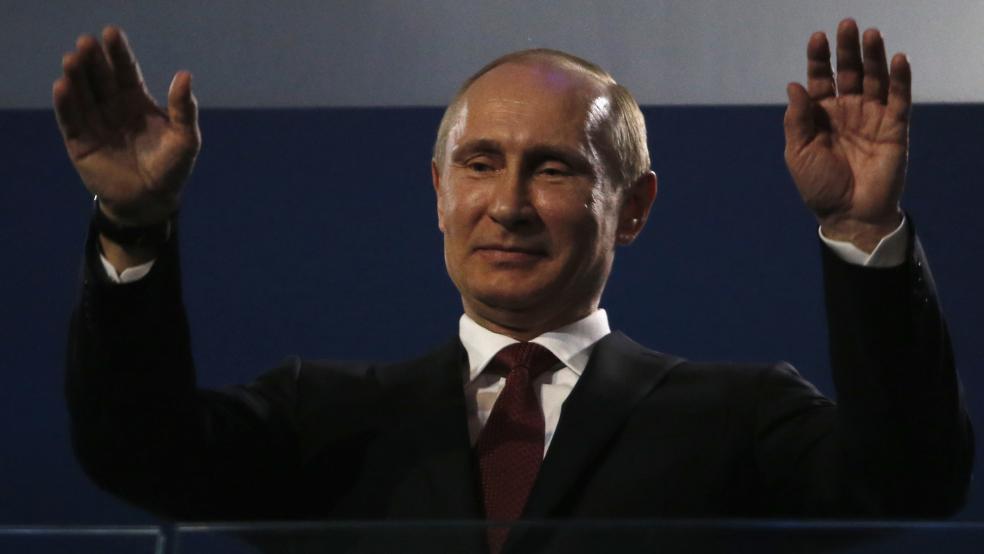The standoff between President Obama and Russian President Vladimir Putin continued Friday during a phone call when each hardened his position over the continuing crisis in Ukraine.
Even though Russia has been isolated by the international community, the Kremlin’s continues to blame the United States for the ongoing standoff. This accusation comes just days after Europe issued a new round of harsh sanctions against Moscow, putting the continent’s economic future in peril.
Related: Russian Oligarchs Are Tired of Funding Putin’s Land Grab
“The Russian leader described Washington’s course of ramping up sanctions pressure as counterproductive, causing serious damage to bilateral relations and international stability in general,” the Kremlin in a statement.
The White House, for its part, saw things differently.
“The president reiterated his deep concerns about Russia’s increased support for the separatists in Ukraine,” the White House said in a statement of its own. “The president reinforced his preference for a diplomatic solution to the crisis in Ukraine.”
Unscripted remarks made by President Obama Friday show just how difficult solving the Ukraine crisis has become. Obama said it was difficult to check Putin because “people don't always act rationally,” meaning that Putin is not acting in a way that would promote Russia’s rational interests.
This is what makes guessing Putin’s next move so difficult. The international community has taken nearly every step at its disposal short of arming Ukraine or sending troops to keep Russia from meddling with Ukraine’s territorial sovereignty. Yet no one knows what he will do next.
Related: Putin’s Bold Power Play in America’s Backyard
He has two options; the first is to strike back against the international community. The second is to play dead and live to fight another day in the wake of the anger over the downing of Malaysian Airlines Flight 17.
Analysts at Morgan Stanley say if Putin decides to fight, his primary weapon will be gas.
“We think Putin now faces a stark choice between a pragmatic response, supporting de-escalation in Ukraine in return for neutrality, decentralization and the lifting of sanctions — or what we characterize as a ‘patriotic’ response, in which Putin focuses on support to the pro-Russian separatist movement in Ukraine, which could trigger a further tightening of sanctions and deepen the divide with the West," Jacob Nell and Alina Slyusarchuk wrote in a Morgan Stanley research note circulated among clients last week.
“We think that Russia could block transit of gas through Ukraine to Europe, pending settlement by Naftogaz of outstanding debt and might also allow a decline in oil exports, which could add a geopolitical risk premium to the oil price,” the authors added.
Irrational choice
Given Russia’s need for European energy supplies, Putin’s rational play would be to keep oil flowing west. However, as Obama suggested, Putin is not acting rationally.
Related: Did Russia Just Push the World to the Brink of War?
“We are skeptical at this stage that Russia would block oil exports, given the disruptive impact this would have on the budget (oil accounts for 44 percent of federal budget revenues) and trade (oil accounts for 54 percent of exports)," Slyusarchuk and Nell wrote.
Others believe that Russia has too much at stake in Ukraine to back down.
“The Kremlin has invested too much to be able to publicly back down at this stage,” Alisa Lockwood, head of Europe and CIS Country Analysis at IHS Economic and Country Risk said in a note. “Harsher sanctions are likely to bring counter-measures that Russia has until now sought to avoid due to the domestic economic impact.”
“His strategy has shown a total lack of understanding of today's globalized world,” added Edward Goldberg, a professor at Baruch College and the New York University Center for Global Affairs. “Grievances and believing that Russia still has a historic need for buffer states have distorted his reality to the point where his actions have dramatically hurt Russia's long-term interests.”
Way to Save Face?
There could be a deal in the works that would allow both sides to save face. The Independent newspaper in the UK reported Thursday that German Chancellor Angela Merkel and Putin were close to a deal that would have allowed Russia to keep Crimea in exchange for allowing Ukraine to build economic ties with Europe and a steady, secure supply of energy to Ukraine.
According to the Independent, the deal fell apart after the Malaysian Airline flight went down. Sources close to the deal said that it is now being reconsidered.
Top Reads from The Fiscal Times
- Why Vietnam Will Be the Next Nuclear State
- Japan’s Pivot Away from the West Leads Back to China
- Obama’s Former Syria Ambassador Slams U.S. Policy





